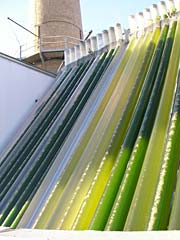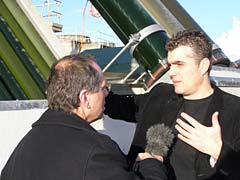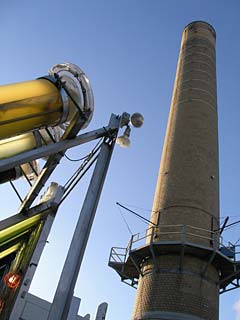Pond Scum or Planet Savers?
Air Date: Week of November 24, 2006

Smokestack emissions bubble through algae-filled tubes at MIT’s Cogen plant. (Photo: Ashley Ahearn)
Pond scum just might be the answer to solving the CO2 woes of the Industrial Age. Host Bruce Gellerman visits with Dr. Isaac Berzin, founder of GreenFuel Technologies Corporation. Berzin is working on a prototype that uses algae to convert power plant emissions into biofuels.
Transcript
GELLERMAN: A few years ago, Isaac Berzin traveled from Israel to the Massachusetts Institute of Technology with two goals in mind--to get his post doc in chemical engineering and save the world.

Smokestack emissions bubble through algae-filled tubes at MIT’s Cogen plant. (Photo: Ashley Ahearn)
Well, he got his degree and now he’s closing in on the other goal: saving the world from global warming by using one of the most primitive forms of life: algae...you know, the yucky stuff that grows on the side of fish tanks and swimming pools…pond scum…just don’t call it that in front of Berzin.
BERZIN: Okay, they’re not pond scum, they’re great. So, I want you to think differently. They’re not ugly or whatever. They’re the sweetest creatures.
GELLERMAN: Clearly, beauty is in the eye of the beholder. But according to Berzin, algae-- primitive one cell plants--are the world's champs at photosynthesis, capturing the suns rays and converting it to chemical energy. That makes the microscopic plants very special, and potentially very useful, in reducing greenhouse gases. On his laptop, Berzin shows me a video of the algae up close and personal.
BERZIN: So, what you're going to see on the screen now is a microscopic view of the algae. Belly dancing around, they have a little mustache. They touch each other with the mustaches.
GELLERMAN: So, this is a plant? It’s a one-celled plant?
BERZIN: Algae are the fastest growing plants on Earth. Their doubling time is measured in hours. My kids ask me, ‘oh Daddy it’s so cute. It’s like pets. So, what do you do with them in the end?’ I say, ‘uh oh, I burn them.’
GELLERMAN: Berzin grows algae because they're super rich in oil. In some species, oil accounts for half the little creature’s body mass. In fact, algae synthesize 30 times more vegetable oil per acre than plants like sunflowers or rapeseed. The algae biodiesel can be used to run engines, or converted into methane or fermented into alcohol. And here's the best part: algae eat carbon dioxide for breakfast, lunch and dinner. And one thing the global warming world has too much of is CO2 from fossil fuel burning power plants.
[SOUND OF DOOR; WALKING]

Bruce Gellerman interviews Dr. Berzin (Photo: Ashley Ahearn)
GELLERMAN: Not far from his office, Berzin takes me to his algae laboratory. It’s outside on the roof of MIT's 20 kilowatt power plant. A yellow brick smokestack towers overhead, and some of the power plant’s exhaust is fed through a row of Plexiglas tubes. Inside, the gooey green algae feed on the CO2 and NOX, nitrogen oxide.
GELLERMAN: Can you describe what we are looking at? It looks like, I don’t know, water gurgling through a bunch of tubes.
BERZIN: Actually, in professional terms it’s called a bioreactor. It’s nothing but three tubes connected together with some sea water and algae in them. And you can see the bubbles bubbling through the system. And you can kind of look at the bubble and follow it, and in the ten seconds or so that the bubbles are spending in the bioreactor 80 percent of the CO2 is moved and 85 percent of the NOX. And at the end of the day you harvest the algae, whatever was growing during the day, you take out of the system. It’s like a cow you milk it and you make biofuels from the algae.
GELLERMAN: So, you’re a farmer, you’re a high-tech farmer.
BERZIN: Yeah, that’s exactly the point. It’s really, really a new age of farming.
GELLERMAN: Granted, this prototype is just small potatoes. But, theoretically, if you created an algae bioreactor twice the size of New Jersey, you could supply the entire petroleum needs of the U.S. The motto for Berzin's company is “waste not, profit more.”
BERZIN: We believe that if you want to make an environmental revolution it should not come as the law. Okay? It should come as a great business. And if it’s a great business, it has life of its own. So, you don’t come to the power industry and tell them, ‘you guys are the worst polluters and I have to shut you down. I have to fine you for every…like a carbon tax, whatever.’ I think that’s the wrong approach. I think the right approach would be, ‘guys, you’re throwing all this CO2 away? Are you crazy? Let’s make more money.’ And that’s how the world will change. That’s how it will become a reality.

Algae tubes stand alongside a smokestack. (Photo: Ashley Ahearn)
GELLERMAN: So, I was taught, you know, if it sounds too good to be true it usually is. What am I missing?
BERZIN: I’ll tell you what the problem is. You have to produce algae in a cost that will be cheap enough to compete with fossil fuels. Then you think, ‘wait a minute, what does this technology need?’ It needs land, and you need water, and you need CO2. So, CO2 is not an issue. You’re located next to a CO2 generating facility. Water, you get to use any quality of water. Treated sewage water, brackish water, ocean water, any water available. The third thing is, the land, usually near these big power plants, no one wants to live. It’s non-fertile land. Nothing grows there even. So, you don’t really compete with agriculture. So, how realistic this is? We believe it is realistic.
GELLERMAN: Isaac Berzin...founder and chief technology officer of Greenfuel Technologies Corp. You can see for yourself if algae are pond scum or planet savers; check out our web site: loe dot org.
Links
Living on Earth wants to hear from you!
Living on Earth
62 Calef Highway, Suite 212
Lee, NH 03861
Telephone: 617-287-4121
E-mail: comments@loe.org
Newsletter [Click here]
Donate to Living on Earth!
Living on Earth is an independent media program and relies entirely on contributions from listeners and institutions supporting public service. Please donate now to preserve an independent environmental voice.
NewsletterLiving on Earth offers a weekly delivery of the show's rundown to your mailbox. Sign up for our newsletter today!
 Sailors For The Sea: Be the change you want to sea.
Sailors For The Sea: Be the change you want to sea.
 The Grantham Foundation for the Protection of the Environment: Committed to protecting and improving the health of the global environment.
The Grantham Foundation for the Protection of the Environment: Committed to protecting and improving the health of the global environment.
 Contribute to Living on Earth and receive, as our gift to you, an archival print of one of Mark Seth Lender's extraordinary wildlife photographs. Follow the link to see Mark's current collection of photographs.
Contribute to Living on Earth and receive, as our gift to you, an archival print of one of Mark Seth Lender's extraordinary wildlife photographs. Follow the link to see Mark's current collection of photographs.
 Buy a signed copy of Mark Seth Lender's book Smeagull the Seagull & support Living on Earth
Buy a signed copy of Mark Seth Lender's book Smeagull the Seagull & support Living on Earth

